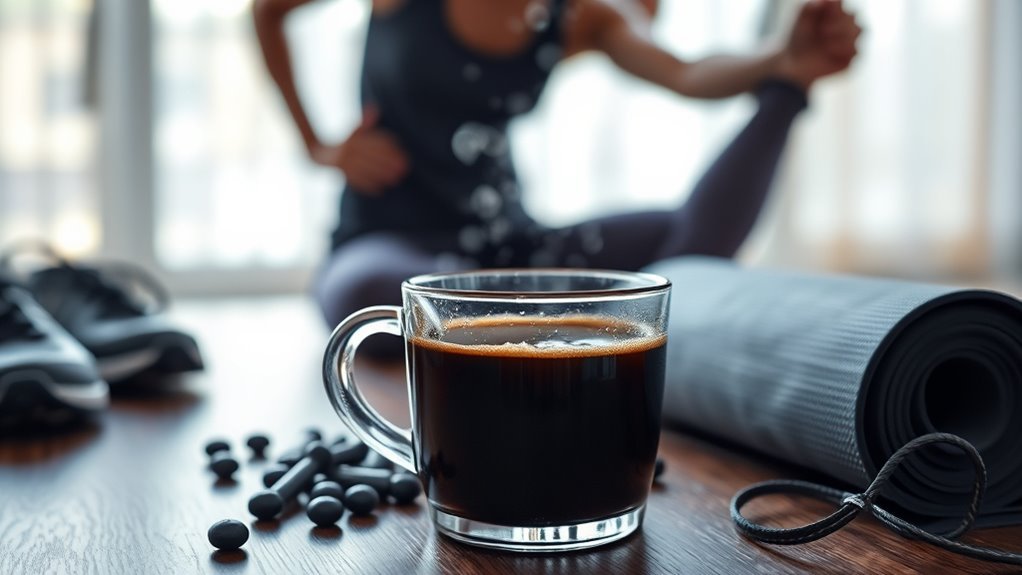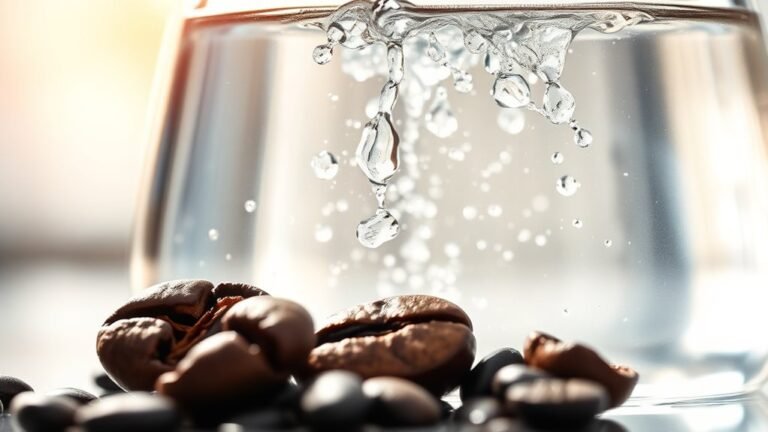The Physiology of Coffee and Athletic Performance
Caffeine markedly enhances athletic performance by boosting focus, endurance, and strength. It enters your bloodstream quickly, improving alertness and reducing perceived effort during workouts. For endurance, coffee prolongs stamina and delays fatigue, while it aids muscle contraction and adrenaline production for strength training. To maximize these benefits, consume coffee 30 to 60 minutes before your workout. Staying hydrated is essential too. Explore how to effectively incorporate coffee into your training strategy for even greater gains.
The Science of Caffeine: How It Works in the Body
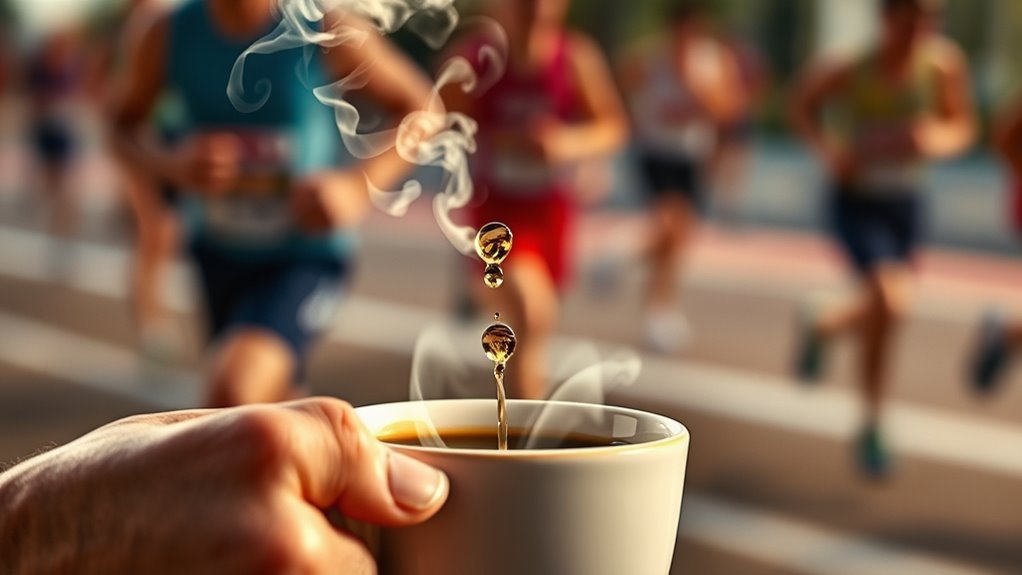
When you consume caffeine, it quickly enters your bloodstream and begins to affect your central nervous system, which can enhance your focus, alertness, and overall performance. This rapid caffeine absorption is due to its small molecular structure, allowing it to navigate metabolic pathways efficiently. As it travels through your system, caffeine blocks adenosine receptors, reducing feelings of fatigue and increasing dopamine release, which contributes to improved mood and concentration. To maximize its benefits, consider timing your caffeine intake about 30 to 60 minutes before your activities. This way, you’ll harness its peak effects when you need them most. Just remember, moderation is key; too much caffeine can lead to jitters and anxiety, counteracting the freedom and focus you aim to achieve.
Enhancing Endurance: Coffee’s Role in Stamina
If you’re looking to boost your endurance during workouts, coffee could be your secret weapon. Caffeine not only enhances stamina but also improves your overall performance when timed right before exercise. By understanding how to incorporate coffee into your routine, you can reveal its full potential for endurance.
Caffeine’s Effects on Endurance
Caffeine, a key component in coffee, has been shown to considerably enhance endurance performance by increasing stamina and delaying fatigue. It’s important to understand how your body responds to caffeine, as individual caffeine tolerance can lead to performance variability.
- Boosts your aerobic capacity
- Improves fat oxidation during prolonged exercise
- Increases time until exhaustion
Timing Your Coffee Intake
To maximize the benefits of coffee for endurance performance, it’s important to contemplate the timing of your intake. For pre workout timing, aim to consume your coffee about 30 to 60 minutes before exercising. This allows caffeine to peak in your bloodstream, enhancing your stamina and focus during your workout. Additionally, consider coffee’s role in post workout recovery. While hydration is key, enjoying a moderate cup of coffee post-exercise can help replenish glycogen stores and reduce muscle soreness, thanks to its anti-inflammatory properties. Just remember, individual tolerance varies, so adjust your intake based on how your body responds. By strategically timing your coffee, you can harness its full potential to elevate your performance and support your fitness goals.
Coffee and Strength: Boosting Power Output
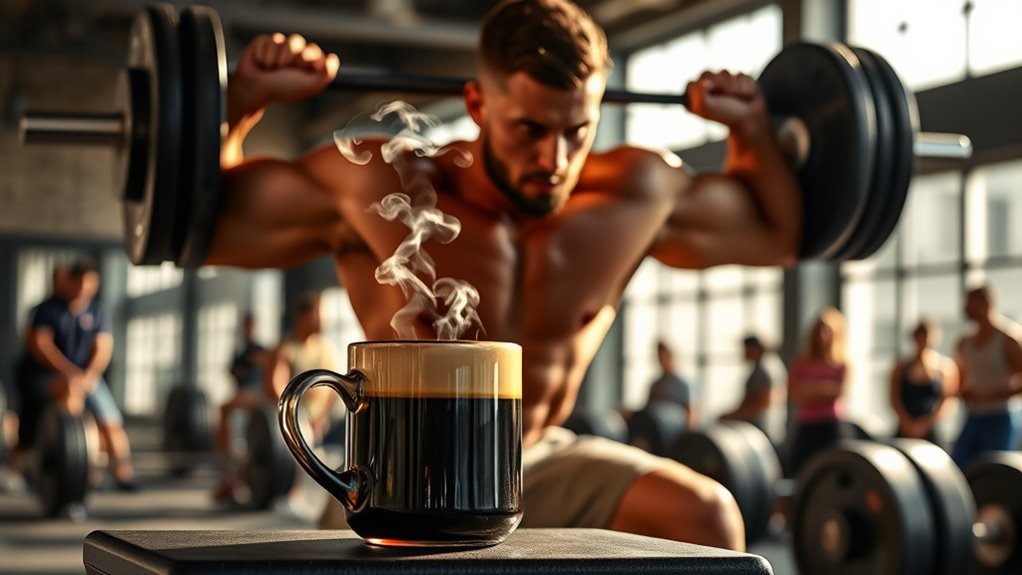
While many athletes turn to various pre-workout supplements, research shows that coffee can greatly enhance strength and power output. Caffeine stimulates the central nervous system, leading to improved muscle contraction and endurance during strength training. If you’re into powerlifting techniques, consider these benefits of coffee:
- Increases adrenaline production, boosting energy levels.
- Enhances focus and reduces perceived effort, allowing for heavier lifts.
- Improves overall performance, leading to better training outcomes.
For peak results, enjoy a cup about 30-60 minutes before your workout. This simple addition to your routine may help you lift more, push past plateaus, and experience the freedom of reaching your strength goals. Embrace coffee as a natural, effective tool for maximizing your power output.
The Impact of Caffeine on Reaction Time
Caffeine’s ability to enhance neural activation can greatly improve your reaction time during athletic performance. When you consume caffeine, it not only sharpens your focus but also boosts your motor skills, enabling quicker responses to stimuli. This can be a game changer in competitive situations where every millisecond counts.
Caffeine and Neural Activation
When you consume caffeine, it can greatly enhance your neural activation, which is essential for improving reaction time during athletic performance. By stimulating caffeine receptors, you’re optimizing your neural pathways, making it easier for your brain to communicate with your muscles. This can lead to quicker responses in competitive situations.
- Boosts alertness and focus
- Reduces perceived exertion
- Improves cognitive processing speed
To maximize these benefits, consider timing your caffeine intake before your workout. Research suggests that a dose of around 3-6 mg per kilogram of body weight can notably enhance your reaction times. So, whether you’re hitting the track or the gym, caffeine might just be the edge you need to elevate your performance.
Enhanced Motor Skills
As you prepare for intense physical activity, enhancing your motor skills can be a game-changer, and caffeine plays a significant role in sharpening your reaction time. Research shows that caffeine intake can lead to motor skill enhancement by improving coordination and reducing reaction times, which can be essential in high-stakes situations. When you consume caffeine, it stimulates your central nervous system, leading to heightened alertness and faster decision-making. To harness these benefits, consider consuming a moderate dose of caffeine about 30-60 minutes before your workout or competition. This timing helps guarantee you’re primed for peak performance. By integrating caffeine strategically into your routine, you can experience significant coordination improvement, giving you the edge you need in your athletic endeavors.
Pain Perception and Coffee: A Performance Advantage

While many athletes rely on coffee for its stimulating effects, its role in pain perception may offer an even greater performance advantage. By influencing pain modulation, coffee can elevate your sensory threshold, allowing you to push harder during workouts or competitions.
- Reduces perceived effort during high-intensity activities
- Enhances endurance by masking discomfort
- Supports quicker recovery by managing pain signals
When you drink coffee, you may experience a more manageable level of discomfort, which can be vital for achieving your goals. This enhanced pain perception can lead to better performance outcomes, as you focus less on fatigue and more on your efforts. So, consider incorporating coffee strategically into your routine for a potential edge in your athletic performance.
Timing Your Coffee Intake for Optimal Results
To maximize the benefits of coffee for your athletic performance, it’s crucial to time your intake strategically. For pre workout timing, aim to consume coffee about 30 to 60 minutes before your session. This allows caffeine to peak in your bloodstream, enhancing your focus and endurance. If you’re looking to boost your performance, remember that a moderate dose of around 3-6 mg per kilogram of body weight can be effective.
On the flip side, post workout recovery can also benefit from coffee. Having a cup after exercising may help replenish glycogen stores when paired with carbohydrates, speeding up recovery and reducing muscle soreness. Ultimately, the right timing can reveal coffee’s full potential, giving you the freedom to perform at your best.
The Effects of Coffee on Hydration and Electrolytes
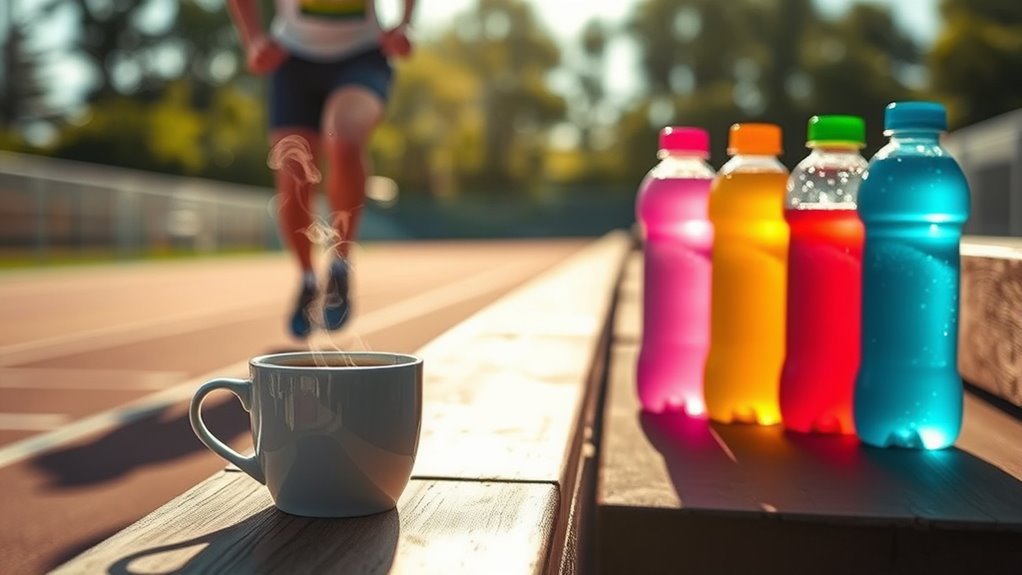
When you drink coffee, you might wonder how it affects your hydration levels. While it’s true that coffee has a diuretic effect, research shows that moderation can help you maintain hydration balance during your workouts. To optimize your performance, consider incorporating strategies to manage your fluid intake and electrolyte levels alongside your caffeine consumption.
Coffee’s Diuretic Effect
Although coffee is often celebrated for its energizing effects, it’s important to contemplate how its diuretic properties can impact hydration and electrolyte balance during athletic performance. The diuretic mechanism of coffee can lead to increased urine output, raising some hydration concerns that athletes should be aware of.
- It may reduce overall fluid retention.
- Electrolyte levels could be affected during intense workouts.
- Timing your coffee consumption is essential for performance.
To maintain ideal hydration, consider your coffee intake before and after workouts. While caffeine can enhance endurance, the potential for dehydration is real. Balancing your coffee consumption with adequate water intake guarantees you stay energized without compromising your performance. Your body will thank you for it!
Hydration Balance Strategies
While coffee can boost your energy levels, managing hydration and electrolyte balance during workouts is essential. To optimize your performance, consider these hydration strategies:
| Strategy | Benefits | Notes |
|---|---|---|
| Drink water first | Maintains hydration | Aim for 500ml before workouts |
| Electrolyte drinks | Replenishes lost minerals | Look for sodium and potassium |
| Limit coffee intake | Reduces potential diuretic effect | Balance with water intake |
| Monitor urine color | Indicates hydration status | Light yellow suggests good hydration |
| Post-workout recovery | Restores electrolyte balance | Include protein and carbs |
Individual Variability: Genetics and Caffeine Metabolism
Understanding how caffeine affects athletic performance isn’t just about the amount you consume; it largely depends on your genetics and how your body metabolizes caffeine. Individual variability, driven by genetic predisposition, can lead to differences in caffeine sensitivity, impacting your performance.
- Some people metabolize caffeine quickly, benefiting from its energizing effects.
- Others may experience jitters or increased heart rate, hindering their performance.
- Tailoring your caffeine intake to your genetic makeup can optimize your workout.
To harness caffeine’s full potential, consider getting tested for genetic markers related to caffeine metabolism. This way, you can fine-tune your consumption, ensuring you maximize your energy without unwanted side effects. Embrace the freedom of understanding your unique biology to enhance your athletic performance.
The Psychological Benefits of Coffee for Athletes

When you grab a cup of coffee before a workout, you’re not just fueling your body; you’re also boosting your mental game. Caffeine is known for its mood enhancement properties, helping you feel more energized and motivated. This uplift in mood can turn a challenging workout into an exhilarating experience, making it easier to push through mental barriers. Additionally, coffee improves focus, sharpening your concentration and allowing you to connect with your movements during training. This heightened awareness can lead to better performance and a more enjoyable workout overall. By incorporating coffee into your pre-workout routine, you’re not only preparing your body but also setting a positive tone for your mental state, giving you the freedom to perform at your best.
Practical Tips for Incorporating Coffee Into Your Training Regimen
How can you effectively incorporate coffee into your training regimen for maximum performance benefits? Start by fine-tuning your coffee preparation to find what works best for you. Here are some practical tips to get you going:
- Experiment with ideal blends to find the flavor and caffeine level that suits your workout needs.
- Consume coffee about 30-60 minutes before your session for improved endurance and focus.
- Stay hydrated! Pair your coffee with water to prevent dehydration, especially during intense workouts.
Frequently Asked Questions
Can Coffee Improve Anaerobic Performance in Athletes?
Think of coffee as a turbocharger for your workouts; it can really ramp up your performance. Research suggests that the caffeine in coffee benefits athletes by enhancing anaerobic performance, especially when consumed at the right time. For ideal results, you might want to drink it about 30-60 minutes before your training. This way, you’ll harness the energy boost, allowing you to push harder and achieve your fitness goals without feeling restricted.
What Are the Potential Side Effects of Excessive Coffee Consumption?
If you’re consuming too much coffee, you might start noticing some side effects. You could experience anxiety symptoms, like jitters or increased heart rate, which can hinder your focus. Additionally, gastrointestinal issues, such as upset stomach or diarrhea, can arise from excessive caffeine intake. To maintain your freedom and performance, it’s essential to enjoy coffee in moderation. Listen to your body and adjust your intake accordingly for ideal well-being and athletic performance.
How Does Coffee Affect Sleep Quality for Athletes?
Did you know that around 30% of people report sleep disturbances linked to caffeine intake? For athletes, the sleep impact of coffee can be significant. Caffeine can disrupt your sleep cycle, especially if consumed too close to bedtime. Since your caffeine metabolism varies, it’s crucial to find your balance. Limiting coffee in the afternoon or evening can help guarantee better rest, ultimately enhancing your performance and recovery for the next training session.
Are There Any Specific Coffee Types That Enhance Performance More?
When it comes to enhancing performance, you might want to contemplate espresso benefits over regular coffee. Espresso’s concentrated caffeine can provide a quicker boost, improving focus and endurance. Additionally, arabica advantages include a smoother flavor and lower acidity, which can be easier on your stomach during workouts. By choosing these options, you can enjoy a performance edge while keeping your body feeling good. Experiment with both to find what works best for you!
Does Coffee Consumption Lead to Dependency in Athletes?
You might find that coffee can lead you down a slippery slope of reliance. As you enjoy its benefits, your body could develop tolerance, meaning you need more to achieve the same boost. If you suddenly cut back, you may experience withdrawal symptoms like headaches or fatigue. To maintain your freedom and performance, consider moderating your intake and listening to your body, ensuring caffeine remains a helpful ally rather than a crutch.
